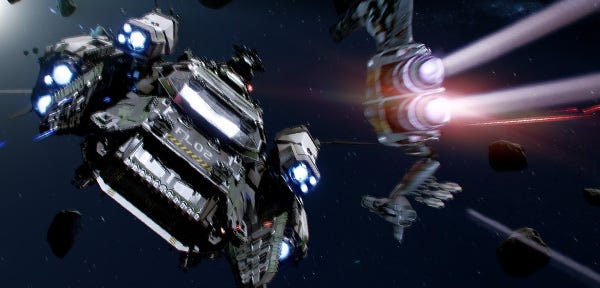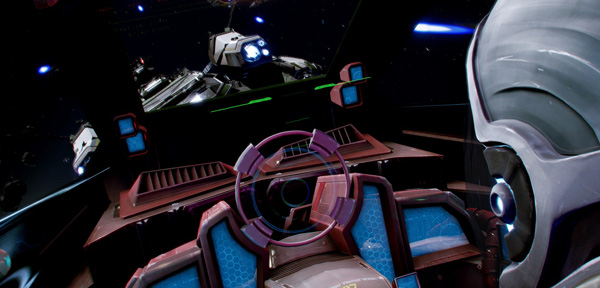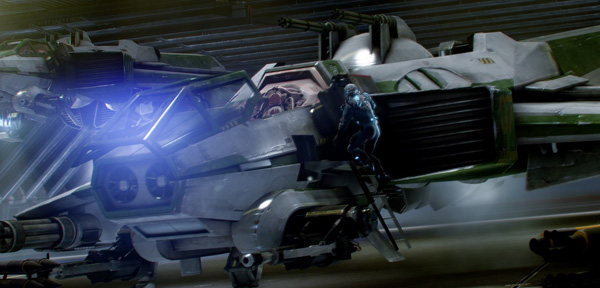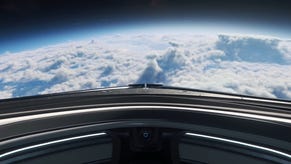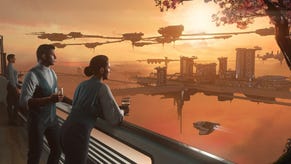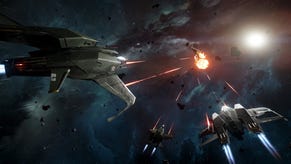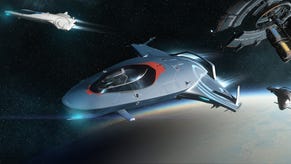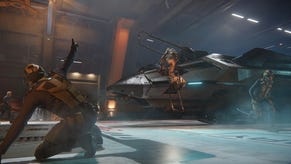Chris Roberts On PC Gaming, Going To Space
Reaching For The Stars, Pt 2
Yesterday, we brought you Chris Roberts. Well, we didn't bring him to you physically (sadly, he refused our requests for a kidnapping), but we presented his thoughts, brain-o-genically frozen and served on a mostly-clean sandwich tray. And now, it's time for a second helping. This time around, Roberts and I discuss space Romans, control schemes, the potentially disingenuous aspects of crowdfunding, the future of PC gaming, and spaaaaaaaace. Going there, that is. You'll find all that and more after the break.
RPS: What's the general backdrop of the universe that you’ve created? There are space Romans, right?
Roberts: Typically when I’ve made games, I always like to focus on a historical setting and then project it into the future. First of all, everyone instinctively understands it, because it’s part of their history. In this particular case, the era that we’ve chosen is the decline and the fall of the Roman empire, but instead of it being the Roman empire, it’s the empire of Earth. Dateline 2942, humanity has expanded across many planets. Mostly in a militaristic fashion, just like the Romans did. Now it’s almost overextended. It’s creaking from constantly trying to keep the empire together and keep its borders safe. But it’s so spread out.
On the western side, there’s a couple of alien races that are the equivalent of the Goths and the Vandals and stuff that are encroaching and raiding and causing havoc on the western side. On the eastern side, there’s a couple of more friendly alien races we’re trading with. There’s a schism between the eastern and western parts of the empire of Earth.
The two major planets in the empire are Earth, which is the historical capital we started from. Then there’s a planet called Terra, an Earth-like planet that was discovered a couple of hundred years into the expansion. The thing that Terra has, besides being bigger and nicer than Earth, it’s in a nexus of jump points. That star system has like 10 different ways in and out, going to different star systems. It’s very connected in terms of communication and trade, whereas Earth itself is not. It’s only got a couple of jump points in. It’s like if you were thinking about an interstellar highway, Earth is off on one of the side trunks, whereas Terra’s right in the network. Terra’s become more and more autonomous as time has gone on, so it’s the equivalent of Constantinople versus Rome. They’re much more focused on trade, because the neighbors of Terra on the eastern side are more advanced, they’re not necessarily so aggressive.
The Terran side of the empire of Earth is much more in favor of diplomacy and trade and less about showing up with your forces and conquering, which is how Earth originally expanded. So we start the game before there’s a proper split, but there will be a split between the two sides, and then we’ll have an in-game event that’s like the sack of Earth further on, like the sack of Rome.
It felt like that was an interesting setting. In an open-world setting, there’s different factions, different interests. You have war on one side where it’s pretty simple, fighting against the barbarian hordes much like the legions did towards the end of the Roman empire. But you’ve also got the opportunity for trade. One side wants to be about trade and diplomacy, the other side is more militaristic. It feels like there’s a lot of possibility and options. If you think about what happened during the decline and fall of the Roman empire, there were lots of things going on. Europe itself was created with all these different feudal countries when the Roman empire broke up. It felt like this was a good setting to pattern it after, to create an open-world galaxy that would have a lot of options to do what you wanted to do.
RPS: What is your focus for advancement and progression? Is it just getting parts for your ship and adding to that?
Roberts: It’s not an RPG in that I work my way up to level 80, I fire my proton gun at you, and I do +4 damage. The combat, there’s an element of skill, because you’re flying around. Really, your character is your ship. You beef up your ship and that’s your suit of armor and the magic weapons you’ve got, to use a fantasy role-playing analogy. Your progression rate is measured there.
It’s not so much that you become a level 5 pilot. The points you can earn in the game are more towards your citizenship status. You can do missions to increase that, and you’ll get some benefits from being a citizen, but they’re only really benefits if you want to be on a certain side of the law. If you want to be a criminal overlord, you probably don’t care much about being a citizen.
RPS: What sort of benefits are those exactly?
Roberts: Like getting afforded the protection of the empire. There will be certain areas at the center where they don’t want pirate attacks, and so they’ll enforce that. But there will be benefits to being a citizen in areas that don’t have the full force of the empire there. Maybe they’ll come to help you out, prioritize you higher. There will be certain things you can do as a citizen. You can vote as a citizen. I think of it as being a Roman citizen. Not everyone was a citizen, and the citizens had a different level of status. They were afforded protection and they had a say in what was happening, versus the ones who weren’t citizens. We have the same kind of idea here.
RPS: With that type of progression, if you choose to fight, you get a very tangible measure of what you’ve done. You feel good about the fact that your ship flies better, hits harder, etc. But what about if you’re just a trader?
Roberts: I think if you’re just a trader, your tangible result is the fact that you’re making a lot of money. It’s not necessarily what I would be doing, because I like the idea of combat and achievement there. But as I was saying, we’re going to let you have the ability to buy some real estate, whether it’s your own little penthouse on one of the planets, or your private club in the back of the bars to invite your friends to, or an asteroid base somewhere. All these things obviously cost a lot of money.
There will be some players, just like you see in certain games where all they do is craft or whatever, that will just try to make as much money as possible, and maybe hire other people to do the dirty work. It all depends. For me, the fun bit is getting out in space and flying around. There are people who just want to play the economic part of it. That’s the idea, though, that we can support it for them. As far as that goes, generally… I don’t know how we could reward someone other than with the fact that they have wealth and can buy and do lots of things.
I think being able to buy your own real estate and invite your friends to it is a pretty big deal. I was giving my crimelord example… You could have your asteroid base and so on, but you could also have a place, hire some people to protect it, people come and see them, like seeing Don Corleone in the beginning of The Godfather - you could do all that. I want to have that sense that you have the ability to do that in the game. I think it would be pretty cool.
RPS: You’ve mentioned very robust peripheral support, which is cool. Using a game pad, using a keyboard and mouse, using a flight stick... Could I use the super massive 320-million button Steel Battalion controller?
Roberts: I’d have to look at the Steel Battalion controller. You’re not talking about the Kinect thing, are you?
RPS: God no.
Roberts: I don’t know. There was that device where you could that can track your finger motions really accurately. I think it’s not out just yet, but they were going to prototype it. It’s going to go in front of your monitor, and the idea is that you can do this in front and it’s super pixel-accurate. So not like Kinect, which is completely inaccurate. If we get that, that would be another thing to support.
It’s not really working yet, but you can see here, this HUD [motions toward cockpit view in Star Citizen], if I look around it’s in proper 3D. It floats in front of your eyes in stereoscopic. That’s kind of like the Iron Man-style HUD tagging. The HUD doesn’t function properly yet, but what happens is that it’ll tag stuff like you see in Iron Man. It’s going to be set up in that style. I can have my weapons display here, and then sweep it onto my HUD, like a Minority Report type of thing. In this version you’ll be doing it like this, which isn’t as cool. If they have that finger-thing I was talking about… If Kinect was half decent I would support that. But the idea would be, you’d still fly with a joystick, but you should be able to like that and you’d see… My hand comes off the joystick and goes like that. The idea is, everything I do in the cockpit, like if I switch something on…
RPS: …you’ll see the corresponding movement from the pilot.
Roberts: Yeah. I’m switching weapons here and hitting the buttons.
RPS: That’s what made me think of the Steel Battalion joke, actually. It’s this big, robust control mechanism where everything corresponds to everything.
Roberts: That’s kind of the idea. I think I saw a few comments online about how the joystick in the setup looks like the Saitek X52. That’s because it’s patterned after it. The idea is, the buttons you press on that would correspond. I wanted it to feel like the VR thing. The more you can feel immersed in it, the better.
If there’s a cool peripheral that makes sense, we'll do it. Because it’s not that difficult to support them. It’s actually pretty simple to support a bunch of stuff. And the engine that we’re building on top of CryEngine already has support for most of this stuff. You just have to map it, and we’re going to do that. Part of the whole philosophy we’re building here is that we’re building a high-end PC game. We want to get back to the roots of Wing Commander. There was a lot of Sound Blaster cards sold because of Wing Commander II, and people wanted CD-ROMs to play Wing Commander III, or upgraded to a 386 or 486. We want to embrace a little bit of that.
RPS: At this point, do the enemy ships have actual AI, or is this a pre-programmed sequence?
Roberts: No, they have AI. They’re attacking the carrier right now. It’s not nearly close to the sophisticated AI we’ll be finishing with, but they have the basic workings. They’re currently all making passes and trying to blow up the turrets. The HUD stuff doesn’t have any of the lead targeting yet, so it’s really hard to hit anything. I was hoping to have a bit more of it done for the demos, but what I thought I could program and how long it would took, there was a bit of a disconnect there. But it’s fun to see them flying around. The turrets all track and try to fire on them. This carrier is pretty crazy. It’s got something like 115 turrets on it. In the demo, we tuned the turrets down, because what happened at the very beginning when we turned it on was that without the turrets having some level of inaccuracy, the enemy ships started attacking and were blasted out of the sky in a few seconds.
RPS: You're planning to release a version of Star Citizen that lets players run their own servers, right?
Roberts: Yeah. We want to embrace the whole Freelancer style of stuff, where you can mod it. Skyrim does a nice job where you can mod and run your own server. Running your own server, you can do what you want to do. I want to also try and get some user-generated content into the game itself, but you have to curate that to a certain extent. You can’t just let people do whatever they want to do.
People could design a spaceship, they could submit it, and if it’s cool enough, we could add it to the things you can buy in the ship store, and then people could get money from that in the big game. If they want to create their own thing and do some of their own content, we give them a lot of the same tools that we use for building the content.
RPS: That sort of feeds back into integrating player action into the world's lore. Like, what if one of the most popular ship types ends up being player-designed?
Roberts: That’s kind of the idea. If you sell a ship, you should almost become a spaceship manufacturer in here. You’d have the equivalent of the Roberts Space Industries, but it’d be yours. And if you managed to design and balance a really cool ship, part of the idea would be that people would buy and use that.
RPS: You actually loaded your crowdfunding page with useful information. One of the things I’ve noticed with Kickstarter lately is that people will make a very vague announcement and then slowly roll out information to entice more people to buy in. But the problem there is that you’re essentially asking the first group of people, who are already going to be spending money on something that may never come out, to spend money without knowing anything. It always seems a bit sketchy to me.
Roberts: Yeah. From my standpoint, the reason why I did it is because, if you’re doing a smaller, indie-style thing, like what Tim Schafer is doing with his graphical adventure, they’re much smaller in scope. They’re not saying this is looking better than a triple-A game. I’m actually talking about something that’s pretty ambitious, and even on the crowdfunding side, the crowdfunding money isn’t enough money. Theoretically, if we raised $10 million dollars, it would be enough, but nobody’s ever done that much.
We did a deal with investors that we already have lined up. To prove to them that there are people who want to play a high-end PC and want to play a space game, the deal we did is that we'd make at least $2 million and it’s all closed. The setup for that was, we knew that we were asking for a lot. You can rely a bit on the nostalgia of, “Hey, you played my games, I’m famous, so trust me to make another game,” which is what most people have done on Kickstarter.
So part of the key on my side was, I felt like it would be better if I spent time and invested my own money. With a lot of people, you throw it up, see if some people give you money, and then you go and do something. I put my money where my mouth is. The idea was, it’s pretty ambitious, so I want to show people what I’m thinking about at a certain level. This is what it’s going to look like. Really talk it through.
Yes, it’s still going on a certain amount of faith that I’m going to deliver this and do all the rest, but they have a lot more information to go on than in a lot of these other cases. That was part of the other aspect of it, to try and treat it much more like an old-school product launch. If I were doing this in a traditional publishing manner, I’d probably work for another year on this and then we would go to E3 and unveil it. I’d do a whole press tour a year before the game came out to get everyone excited and talking about it. So I did it a year earlier than I would have done, because we’re saying, “We would like to get the really excited core fans to be part of this early. We want to have you help back it because it’s going to unlock financing, but you can also be part of the community. You can play stuff early as an alpha tester. You’ll be part of the sounding board to help make decisions.”
RPS: You’re going PC only, which is really awesome. And honestly, at this point, I don’t think the PC has really ever been healthier as a gaming platform.
Roberts: I totally agree.
RPS: But there are some things on the horizon that are a bit worrisome, like Windows 8 and how closed it’s going to be. Meanwhile, things like tablets and mobile are becoming the big standards in computing. They're also closed platforms. Are you worried at all about the PC’s future as a platform that allows for this kind of scope and creativity and ambition and openness?
Roberts: I chose the PC because it enables that. The game I want to build and the community I want to build, I could not do it on a PlayStation or an Xbox right now. The terms of service would prevent me. The only platform I can do it properly with is the PC. I guess my answer would be, if there are other platforms coming along that let me deliver this experience, then I would do it. Even the next-gen consoles, which technically will be able to handle this if they change it around. I would certainly consider supporting it. But it’s the open platform aspect that’s the most important for me, to let you integrate with the community. Even on the tablet basis, if the tech comes to a level that lets you do that, I would certainly consider supporting it.
There’s a bit of worry. I feel like the Windows 8 thing is worrying. Although the issue is more the way they’ve set it up. They still have the same stuff you have in Windows 7, it’s just that they’ve tried to build this Mac type of [infrastructure] because that’s all they want to do, right? Microsoft wants to control an App Store-style thing. Star Citizen isn’t going to be a Metro application. This is going to be an actual client type of game.
We’ll have to see what happens. I think it’s a bit of a bummer, because Windows 7 is actually the best Windows we’ve ever worked with. It’s really rock-solid. My wife’s a Mac person, but her Mac is awful. You plug things in and it doesn’t configure. You have to install drivers. It used to be much better than Windows, and now I plug anything into my Windows 7, it automatically detects it. It’s robust. Developing stuff on it, I’m crashing all the time, but I never have to reboot Windows. I’m amazed at how good it is. Vista sucked, but Windows 7 has been really good. Especially the Ultimate with all the memory and everything. It is a bit worrying that Microsoft may be doing the whole Apple thing and trying to control it.
They finally got it right after all these years. It took them 20 years, and now they’re going to take a step back?
RPS: You're obviously someone who's head-over-heels in love with space. Would you ever pull a Richard Garriott and go into orbit?
Roberts: I think I told Richard that I’d go up. Carmack’s got his little rocket thing that he built. It’ll be much cheaper. I’m not going to spend $30 million dollars like Richard did to go into space. But yeah, I’d be interested in going up.
It’s a bit ironic, because Richard builds fantasy games, but he’s obsessed with going to space. I build space games and [I haven't done it yet]. All that stuff’s pretty cool. I’ve known Richard forever, because we were together at Origin. David here, who’s helped me out and helps Richard out… We’re all friends. We’re using their conference room and all the rest [laughs].
But yeah, I do remember when I was first working on my stuff at Origin, I helped Richard out on Ultima IV. I was writing a bunch of the conversations with him. He was telling me about how he wanted to go space, even back then. It was a long time ago. I was thinking, that’s a great dream, but are you really going to be able to? I wasn’t necessarily telling Richard that… But then he did it. I have to give him kudos. It’s what he wanted to do. When I was 19, I was helping him do this stuff, and how old was Richard then? He was probably, what, 20? It was 1986, 1987, so maybe 24-25. This is back when none of this stuff was happening. It was only the province of major governments. There was still a Soviet Union. But he did it, so complete hats off to him. Anyway, I agreed to go up in the thing that Carmack’s working on. It’s going to be $80,000 dollars instead of $30 million.
If Star Citizen does well, maybe I’ll be able to afford it. That’s not really why I’m making Star Citizen. I’m making it because it’s the game I wanted to play forever. It’s my dream. There’s a lot of things I wanted to do in my past games, whether it was Freelancer or Privateer or Wing Commander, that I couldn’t because of the tech at the time. I feel like you can do it now. The geek in me wants to build that and realize it that way. I think that’s completely fascinating. The ability to create a virtual world in a computer is awesome.
RPS: So we’re not in any danger of losing you as a game designer to a life of space crime.
Roberts: No, not yet. I’m back in games. I took my break and I’m quite happy to be back. I’m enjoying it. I haven’t done a lot of programming since I built Strike Commander. In the old days I used to write all the engines for the stuff we did. As the projects got bigger, I was ending up spending all the time directing and managing. In the old days, once Wing Commander became successful, it was always like, “We need it this year! We need to drive the revenue!” You’re under a lot of pressure.
With this one, since nobody was expecting it, I could spend a year and put a small team together and just play with ideas and do some programming myself. I had a lot of fun. To a certain extent, when you’re programming a world like this, you’re kind of a god. You make the rules up. You decide. It’s fun when you don’t have the pressure of 100 people that are on a team waiting to find out what’s happening. That’s what’s happening with a big publisher. You have a group of people and you roll from one project to another.
Of course, you don’t need 100 people on day one, but you do need 100 people at the end of it. Since everyone’s on salary, you can’t just say, “Okay, we’re not paying you now, but we’ll pay you in a year’s time.” You basically have your full team from the very beginning. So you have this pressure to come up with answers for people, to give them stuff to do. Sometimes it prevents you from really thinking things through and getting stuff to work. It was fun, before the announcement, to spend the time working and not have that pressure. I’m having fun coming back and doing this stuff.
RPS: Thank you for your time.
